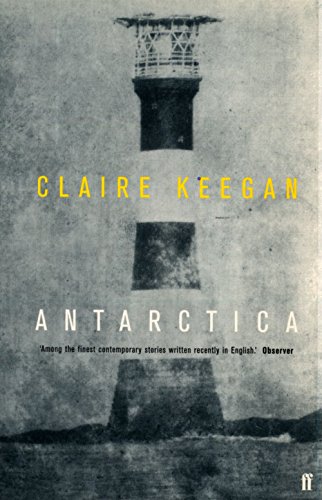
photo © Jonathan Potts, 2013
by Nicola Daly
Claire Keegan’s story ‘Antarctica’, from her debut collection of the same name, hooks you from the first: ‘Every time the happily married woman went away she wondered how it would feel to sleep with another man.’
Keegan has a gift for creating contemporary stories like this that crackle with excitement. You may, at this point, feel you know where the story is going. The scenario seems a familiar one: a married woman longs for passion and excitement before middle-age take its toll. We journey with the woman as she makes a trip to an undisclosed city for an annual shopping trip. However, the story is shrouded in mystery and Keegan has a way of leading the reader up a certain path only to suddenly take us on a detour, or to stop abruptly and lead us up a back street that we never knew existed.
To the outside world this woman, whose name we do not know, is content. She is placed in the familiar landscape of a provincial hotel, where she seems desperate to dig herself out of a rut.
On Saturday she walked to the shopping centre. Families were out, pushing buggies through the morning crowd, a thick stream of people flowing through the automatic doors. She bought unusual gifts for her children, things she thought they wouldn’t predict.
Whilst telling the reader what they need to know, in order to engage with the characters in the tale, Keegan still manages to keep the suspense alive. ‘She bought an electric razor for her eldest son – he was getting to that age – an atlas for her daughter and for her husband an expensive gold watch with plain, white face.’ From this information, we can surmise that the woman has two teenaged children and a husband that she loves, but that she has reached a time in her life when she is bored, or else feels that her family no longer need her in quite the way they once did. Keegan implies, through the woman’s actions, that she is perhaps searching for something more. And as readers we’re on tenterhooks, of course, because we still don’t know if our protagonist is going to fulfil her fantasy and sleep with a stranger.
 We soon discover that the woman means business: ‘She dressed up in the afternoon, put on her short plum coloured dress, high heels, her darkest lipstick and walked back into town.’ Reading this is like watching a short film unfold. The description of the pub that our main character enters is so vivid, from the sound of Irish ballads on the jukebox, to the low-beamed ceiling, to the description of the guy sat next to her at the bar. ‘He had a red complexion, a gold chain dangling inside a Hawaiian print shirt, mud coloured hair. His glass was almost empty.’
We soon discover that the woman means business: ‘She dressed up in the afternoon, put on her short plum coloured dress, high heels, her darkest lipstick and walked back into town.’ Reading this is like watching a short film unfold. The description of the pub that our main character enters is so vivid, from the sound of Irish ballads on the jukebox, to the low-beamed ceiling, to the description of the guy sat next to her at the bar. ‘He had a red complexion, a gold chain dangling inside a Hawaiian print shirt, mud coloured hair. His glass was almost empty.’
Here, Keegan demonstrates her skill in taking two mismatched characters and throwing them together. She tells us little about the man; she doesn’t name him, but instead tells us that he is a talker and that he works in an old folks home, has no relatives, is unmarried and has few friends. Our protagonist sees ‘there were no rings on his fingers’ and this confirms, to us, that she believes our man is all he appears to be.
The reader can’t know at this point but, as with the plot of a sophisticated Hitchcock thriller, Keegan is already setting us up for the next set of events. She knows that by telling us these things about our mystery man, and describing his dress so perfectly, we will assume that he is nothing more than a good-natured looser. Yet she goes one further, allowing the man to qualify our suspicions about him: ‘“I am the loneliest man in the world,” he said.’
When the man asks the female character if she is lonely, she replies that she is married, gently illustrating how some of the loneliest people can actually be those in a relationship. Keegan goes on to build up a series of playful scenes where the woman forgets herself for a while and allows the man to teach her pool. From this we learn one or two interesting things about the man, who ‘didn’t let her win one game’.
The first time the reader fears all might not be well is when our main protagonist finds herself drunk, after not drinking very much at all: ‘She couldn’t remember ever being drunk like this.’
We are soon back in familiar territory, though, when the woman leaves the bar with the man and they go on a tour of the area.
Brown ducks flew across the water and landed in a nice skim on the moat. When a black Labrador came bounding down the path, a huddle of pigeons rose as one and settled magically in the trees.
Keegan subtly describes the woman‘s change of mood: “I feel like Francis of Assisi.” In many ways, this marks a sudden change in the story, because after this the woman becomes more reckless – just as the beginning of the story pre-empts. The woman unwittingly begins to lose control and puts herself into the hands of the male stranger, agreeing to go back to his house to have dinner with him.
“I know your type,” he said. “You’re wild. You’re one of these wild middle-class women.” The reader presumes this statement only serves to delight our female character, who is being seen as her exciting, evocative alter ego. She is getting carried away by the romance of the situation, buying a lottery ticket along with the groceries the man buys for their meal. “We’ll split it if we win,” she said “Go to the Bahamas.”
As readers, we empathise with the woman and, if we had any moral qualms about what she was doing, these are quelled since we begin to understand that all she wants is for somebody to lavish attention on her and make her feel something other than a wife and mother.
 After the familiarity of the shopping trip – in which the man carefully chooses ingredients, and even encourages the woman to choose a fish – Keegan then hurls the reader back into the dark. We are lead through the evening streets to a dilapidated block of flats. It’s an environment that is outside the protagonist’s comfort zone, but we are not overly concerned; this is a woman amidst something of an urban adventure: ‘She giggled and climbed and giggled and climbed.’
After the familiarity of the shopping trip – in which the man carefully chooses ingredients, and even encourages the woman to choose a fish – Keegan then hurls the reader back into the dark. We are lead through the evening streets to a dilapidated block of flats. It’s an environment that is outside the protagonist’s comfort zone, but we are not overly concerned; this is a woman amidst something of an urban adventure: ‘She giggled and climbed and giggled and climbed.’
Once inside the flat, the woman is impressed by the size of the bath and, when invited to try it out, she does. Keegan makes it clear to the reader that she only does this because, by then, she feels comfortable with the man. We are given to understand that he is one of those exceptional people you meet who immediately puts you at your ease, making you feel as if you have known him for a lifetime. ‘It was like they had done it all before. She thought him the least threatening man she’d ever met.’
More scenes follow that are in stark contrast with each other. The first being the man’s insistence of washing the woman in the bath and then wrapping her in a towel as if she were a child. It appears that, in some complex way, all this man wants to do is fulfil the woman’s need to be looked after for a change, rather than diving straight into a sexual encounter. In fact, the power jumps into the hands of the female protagonist, as she makes the first move: ‘She undid his belt, slid it from the loops.’ The woman fulfils her sexual appetite and, even though the man falls somewhat short of her original fantasy, he is both passionate and inventive in his love-making, appearing to make up for any shortcomings the protagonist might have assumed. ‘“You’re a very generous lover,” she said.’
However, after a day and night full of pleasure, the woman has to return to her real life and it’s then that Keegan throws the reader back into the abyss. The woman returns to her hotel, pleased that she could sleep with a stranger without getting caught up in a mess of emotional ties, when the man calls round, begging her to spend her last few hours with him. ‘She wasn’t in the mood for sex. In her mind she was already gone, was facing her husband in the station.’
Keegan is not specific about whether the woman goes back to the man’s house and enters into his sex game out of a sense of duty to him, or because she is flattered by him and wants to make the most of the situation, after all, in a matter of hours she will be returning to ordinary suburban life. Being dutiful is something we understand this character is adroit in and I feel it’s reasonable to presume that this fully rounded character acted out of both motives.
From the moment the man handcuffs our female character to the bed, the story shifts and Keegan makes us acutely aware that all the playfulness that was evident before has dried up, suddenly. ‘There was something deliberate about him, something silent and overpowering.’
In the scenes that follow, we see much more of the male character‘s real personality unfolding, as Keegan presents us with a modern love story that has all the density of a classic thriller. We are reminded of a conversation between the couple regarding his failed marriage: ‘“Some things you just have no control over,” he said.’ A menacing nature is hidden behind his softly spoken words, yet Keegan also makes us able to appreciate that this monster has been made by a life of insecurity and loneliness. “It’s not what you think, he said. It really isn’t. I love you, you see. Try to understand.” In another conflicting image, the man’s behaviour contrasts now with the woman’s complete helplessness: ‘Frantic, she tried to undo the handcuffs.’
Keegan’s stories, whilst set in the modern world, are often shrouded in Irish mythology and fairy tale. ‘Antarctica’ is no exception. Within in the closing of this tale, Keegan suggests that you should perhaps be careful of what you wish for. She gently makes the point that one can seem so unhappy and yet there is always something much worse that could occur. She also makes the reader appreciate the old saying about the grass being greener on the other side, for in her utter state of panic the woman only thinks of her loved ones. ‘She thought of him and felt nothing. She thought of her husband and children. They might never find her. She might never see them again.’
The story closes with the woman sensing that she will never escape this nightmare. Keegan skilfully leaves the reader with three powerful images to describe the desolation the woman feels: the first image is of a freezing Antarctica, the second is of hell, and the third is of eternity.
~
Nicola Daly‘s work has been published in a variety of magazines and anthologies such as Myslexia, The Rialto, Magma and many more. She won third prize 2014 in HISSAC short story competition and the Gatehouse Short Story Award for her novella entitled The Years Roll by at an Alarming Rate.
~
photo of Claire Keegan © Murdo MacLeod

